Happyland | |
|---|---|
| Coordinates: 34°47′48″N96°32′58″W / 34.79667°N 96.54944°W | |
| Country | United States |
| State | Oklahoma |
| County | Pontotoc |
| Elevation | 899 ft (274 m) |
| Time zone | UTC-6 (Central (CST)) |
| • Summer (DST) | UTC-5 (CDT) |
| GNIS feature ID | 1100475 [1] |
Happyland is an unincorporated community in Pontotoc County, Oklahoma, United States. [1] It is about 8 miles east of Ada on Oklahoma State Highway 1. [2]
Happyland has frequently been noted on lists of unusual place names. [3] [4] Sign theft of the Happyland sign has been reported. [5]


